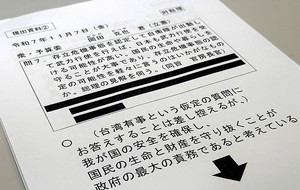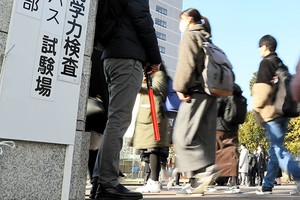By KYOSUKE YAMAMOTO/ Staff Writer
June 11, 2023 at 15:30 JST
 An electronic signboard in Tokyo’s Kabutocho district shows the Nikkei 225 index topping 32,000 during trading on June 5. (Toru Nakagawa)
An electronic signboard in Tokyo’s Kabutocho district shows the Nikkei 225 index topping 32,000 during trading on June 5. (Toru Nakagawa)
Japanese companies helped propel the benchmark index of the Tokyo Stock Exchange to its highest level in 33 years after they announced plans to buy back their own shares worth a record 3.2 trillion yen ($23 billion).
Share buybacks generally push up stock prices because they theoretically raise earnings per share, thereby returning profits to shareholders.
The announcement by listed companies in May to repurchase their own shares to the tune of 3.26 trillion yen topped the previous record of 3.13 trillion yen set in the previous May, according to Tokai Tokyo Research Institute Co.
The total value for this year could exceed the all-time high of 9.4 trillion yen in 2022.
Listed companies often announce plans to repurchase their own shares in May, when they release their financial results for the business year ended in March.
This year, many companies announced share buybacks on the back of robust earnings.
They have also been driven in part by a TSE notice issued in March that effectively called on companies to take steps to improve their share prices, which are often sluggish relative to their net assets.
Investors welcomed the share buybacks announced by companies across industries.
Trading house Mitsubishi Corp., which reported a record 1.18 trillion yen in net profits for the year through March, announced plans to repurchase its own shares worth 300 billion yen. Its share price jumped from around 5,000 yen to more than 6,000 yen.
Toyota Motor Corp. said it plans share buybacks worth 150 billion yen.
The Nikkei 225 index, the TSE’s benchmark index, broke the 30,000 mark in May. The index closed at 32,506.78 on June 6, setting a new high since the collapse of the late 1980s asset-inflated economic boom, before it fell back slightly.
“Market pressures are building on companies that have not announced plans to repurchase their own shares,” said Seiichi Suzuki of Tokai Tokyo Research Institute. “More companies are expected to follow suit before they announce their half-year financial results.”
The government has been urging companies to increase their capital outlays and raise wages in the push for sustainable economic growth.
Critics contend that companies risk limiting resources for business investments and pay increases if they excessively allocate cash at hand for share repurchasing to please investors and prop up stock prices.
“The domestic economy will continue to shrink and labor productivity will decline if executives give priority to share repurchases,” warned Takashi Shimizu, a professor of business administration at the University of Tokyo.
“It is good when stock prices rise on the basis of restructuring of businesses, but I am concerned that they have been simply inflated by share buybacks.”




















A peek through the music industry’s curtain at the producers who harnessed social media to help their idols go global.
A series based on diplomatic documents declassified by Japan’s Foreign Ministry
Here is a collection of first-hand accounts by “hibakusha” atomic bomb survivors.
Cooking experts, chefs and others involved in the field of food introduce their special recipes intertwined with their paths in life.
A series about Japanese-Americans and their memories of World War II